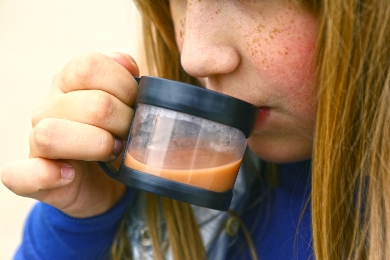09 February 2018
 University of South Australia researchers are calling for parents and clinicians to take stock of children’s diets following new research that shows a casual relationship between primary-aged children’s caffeine intake, poor sleep and difficult daytime behaviour.
University of South Australia researchers are calling for parents and clinicians to take stock of children’s diets following new research that shows a casual relationship between primary-aged children’s caffeine intake, poor sleep and difficult daytime behaviour.
The study, published in the Journal of Clinic Sleep Medicine, examined the relationship between caffeine consumption, sleep, and daytime behaviour in Australian children aged 8-12 years, seeking to determine the average caffeine intake, the source of caffeine consumption, and the impact it had on children throughout the day.
Led by UniSA’s Dr Millie Watson, the research found 87 per cent of Australian primary-aged children had consumed caffeine throughout their weekly diets.
“Caffeine is a known stimulant that increases alertness, which is great for adults looking to manage drowsiness, but for children, it presents a plethora of problems,” Dr Watson says.
“Unlike adults, children are far less able to handle caffeine in their systems.
“When caffeine is included in children’s diets, their sleep quality and quantity suffers, and as a result, so does their behaviour the following day.
“The challenge for parents is to take note of which foods and drinks might contain caffeine, and to limit or avoid these altogether.”
Examining the responses of 309 Australian children, the study found children’s caffeine consumption ranged from 0-151 milligrams per day, with the average daily intake between 10.2 + 17.4 milligrams—the equivalent of a 50 gram solid milk chocolate bar or 30 milliliters of Red Bull.
“The largest contributor to children’s caffeine consumption is tea and coffee, making up 41 per cent of children’s total caffeine intake,” Dr Watson says.
“This is closely followed by soft drinks, which contribute 40 per cent of caffeine intake, chocolate food and drinks—the most commonly consumed caffeine source, but accounting for only 13 per cent of caffeine—and finally, energy drinks comprising six per cent.
“While these amounts of caffeine are within the suggested international guidelines, and are small by adult standards, even modest amounts of caffeine can affect children’s sleep, academic performance and well-being,” Dr Watson says.
The study also found that children who consumed significantly more caffeine, slept far fewer hours (7-8 hours per night) than those who had consumed less caffeine (sleeping 9-11 hours per night).
“When children suffer from broken or reduced sleep, it increases their propensity for internalising behaviours, such as anxiety, depression and social withdrawal,” Dr Watson says.
“We’re not saying caffeine alone is responsible for poor sleep and challenging behaviours in children, but it is a proven key contributor.
“So, before parents and clinicians turn to medications to calm or control children’s sleep or behaviours, perhaps the first step is to take check of their caffeine intake – it may just be the anomaly you’re looking for.”
Contact for interview:
Dr Millie Watson, School of Health Sciences M: 0432 280 767 | email: Millie.Watson@unisa.edu.au
Media contact: Annabel Mansfield mobile: 0417 717 504 email: Annabel.Mansfield@unisa.edu.au


